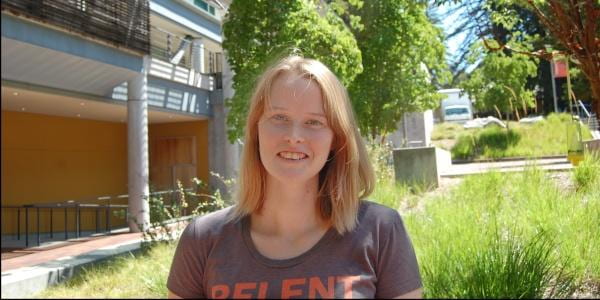Degree Program: Ph.D., Technology and Information Management
Graduate Institution: UC Santa Cruz
Undergraduate Institution: NYU
Department: Computer Science and Engineering
Hometown: Seattle

“I’m working on this human trafficking project. The broad question was whether environmental events affect human traffickers. We found an increase in mentions of certain ethnicities after hurricanes in these ads, especially ethnicities from Caribbean countries.”
What are you studying?
I’m in the technology and information management PhD program. I’m studying, in broad terms, data science for social good. Right now I’m working on this human trafficking project, which recently won a Best Paper Award. I’ve worked on cyberbullying detection, understanding the effectiveness of online education for students, energy disaggregation, and more recently, a recommender system for sustainability with the sustainability team at Amazon. They had this problem of finding which products were sustainable in a large catalogue, because they don’t have labels for them so I worked with them on solving that.
What are some challenges that come with using technology for social good?
Something that interests me is: how do we get the data we need to address that bigger problem and even once we do that, how do we get that to the right people? We could predict where human traffickers will go, but I’d love to give that tool to law enforcement. Right now, it’s just words on a paper and I don’t know how exactly to let law enforcement know that I have this tool. That’s another piece that will actually make it relevant. I want to stay in academia, I think, but I’d love to do something like that as a consultant. I don’t know if I’d establish a center, but if I had students I’m advising I could work with a nonprofit to get data to give to my students and hopefully complete the cycle. I definitely want to do that.
Tell us about your research on human trafficking
The broad question was whether environmental events affect human traffickers. An original theory was that maybe if a large, catastrophic event happened in a town, law enforcement would be busy doing rescue and repair so maybe we’d see a rise in crime. In applying that to human trafficking, we wanted to see if we saw a rise in trafficking ads since we don’t have actual trafficking data. We didn’t really see that, so we started getting more specific and found an increase in mentions of certain ethnicities after hurricanes in these ads, especially ethnicities from Caribbean countries. We also looked at a typhoon in East Asia and saw that the mentions of Filipinos in trafficking ads increased in the Middle East, which is a large hub for human trafficking.
We know populations vulnerable to migration become vulnerable to trafficking because they’re usually looking for jobs. Traffickers will offer a seemingly great job and people go to them and are imprisoned and abused, etc. Then we wanted to see if traffickers moved to different places. If they were going to go to a place, but then a hurricane happened, would they then avoid that place after the hurricane and if they avoided it, where would they go instead? That may have repercussions for law enforcement because they could lose track of a trafficker they were closing in on because they moved. Then we wanted a predictive model to see whether we could predict where they go. We were able to do this—not perfectly, but with better results than I expected.
The paper we wrote on this research won Best Paper Award at the International Conference on Weblog and Social Media Data. The award funds were donated to two groups that combat human trafficking: Polaris and Thorn. I encourage others who want to see an end to human trafficking donate to these groups as well.
What’s next for you?
I’m going to Boston for a postdoc working on mobile health interventions. The team builds apps for people who are in a program to stop doing drugs and the apps will send reminders related to overcoming addiction. It’s another issue with available data: people have phones that provide us that data, so let’s use it. But I think there are good possibilities for apps that remind people to do things like take their medicine, especially in the developing world where the phone could be the only point of contact with other people. I don’t know too much about it yet but I’m excited.
If you would like to contribute to a group that combats human trafficking, visit https://polarisproject.org/ or https://www.wearethorn.org/.
This block group hides your featured image, remove this block group to show your featured image again.



